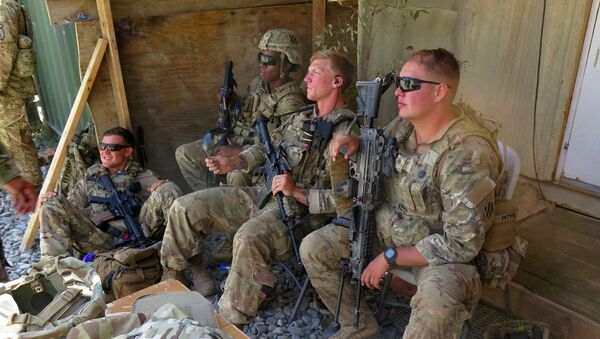On 7 September, Donald Trump abruptly cancelled a preplanned meeting with major Taliban* leaders and, separately, with the President of Afghanistan Ashraf Ghani at Camp David. In a series of tweets, the US president revealed that he had made the decision to cancel the meetings after discovering that an attack in Kabul killed one American soldier and eleven other people.
"I immediately cancelled the meeting and called off peace negotiations", Trump wrote. "What kind of people would kill so many in order to seemingly strengthen their bargaining position?"
The next day, the Taliban condemned the US president's move claiming that it would "further harm [the US] credibility and will show their anti-peace stance in a more clear way".
Citing an administration official, ABC News pointed out that the summit had been planned a week ago by Trump and his security advisors ahead of the upcoming national elections in Afghanistan scheduled for 28 September.
Donald Trump is seeking to deliver on his election promise and withdraw an estimated 5,000 service personnel from Afghanistan, reducing US numbers to around 9,000 or even 8,000 as part of a deal that would effectively bring the 18-year long military conflict to an end.
Why Time is on the Side of the Taliban
However, following the cancellation of the talks, "it's unclear where the discussions stand", ABC News notes. Meanwhile, Taliban spokesman Zabihullah Mujahid has threatened that Trump's move would "lead to more losses to the US."
Dr Joseph Fitsanakis, associate professor of politics in intelligence and National Security Studies program at Coastal Carolina University, believes that the White House's decision to cancel the Camp David meeting between Afghanistan’s warring sides is unlikely to affect "the peace process, such as it is."
"The White House is fully aware that it cannot withdraw its troops from Afghanistan without having first received assurances from the Taliban that they will not launch an all-out attack on government-controlled areas", he says.
On the other hand, the professor suggests that whatever conditions of a deal are, it is unlikely that it will result in a longstanding peace in the region. Once US troops pull out of Afghanistan, the strife between the government and the terrorist military group will resume.
"Washington will continue to do what it can to maintain a semblance of stability in Afghanistan, but it is fully aware —as is everyone else who is monitoring the situation— that time is squarely on the side of the Taliban. The latter have one big advantage: they are from the region and — unlike foreign troops — will always be there. All they have to do is to wait until the foreign troops leave or become too weak to hold them back. At that time, they will attack," the academic says.
While Fitsanakis alleges that backchannel negotiations between Washington and the warring parties still continue "even at this stage", he does not foresee official peace talks restarting anytime soon. According to him, there are two reasons for that:
· "The US does not want to be seen to be leaving Afghanistan without a piece of paper that says that peace has been reached", since "the opposite would amount to an admission by Washington that America’s longest war has achieved virtually nothing".
· "The Taliban want to see the end of American military presence in the Afghanistan."
Therefore, it is more likely that the terrorist group will provide any assurances (within reason) to let the US president tell his voters "that victory has been won in Afghanistan" and withdraw his troops.
"They will then wait for a couple of years, until either the American president has changed or until most American voters — who typically have short memories — have moved on to something else. At that point, they will simply continue their armed fight to take over Afghanistan," he predicts.
Rise of Daesh is Greater Challenge Than Taliban
According to the professor, the US upcoming pull-out may lead to yet another problem, namely the emergence of Daesh (ISIS/ISIL/Islamic State)* in the region.
"Right now America’s fear in Afghanistan (which is also a major concern for Russia, Pakistan, and other regional powers) is the growth of the Islamic State there, which at this time is far more powerful than al-Qaeda ever was in Central Asia," Fitsanakis suggests.
The academic argues that having been defeated in Syria and Iraq, Daesh may cause more problems for the West in Afghanistan and become even a greater challenge than the Taliban.
"Ironically, the West has already begun to rely on the Taliban to counter the Islamic State in Afghanistan," he says. "This is a complicated situation, and it will become more, not less, complicated when American military forces leave the country."
The US military campaign in Afghanistan started in 2001 and has been maintained for 18 years. The troublesome region has long suffered from an unabated conflict between government troops, Taliban militants, al-Qaeda* affiliates as well as Daesh and other jihadi groups despite the presence of a US and NATO forces. According to a UN report, released in July 2019, in the first half of 2019 Afghan and US military forces killed more civilians in the country than insurgents did.
*Taliban, al-Qaeda, Daesh (ISIS/ISIL/Islamic State) are terrorist groups banned in Russia.
The views and opinions expressed by the speaker do not necessarily reflect those of Sputnik.




